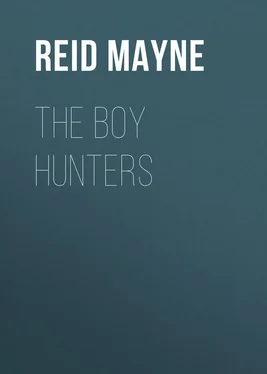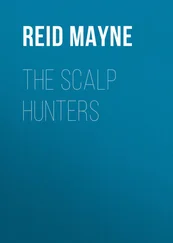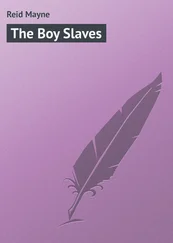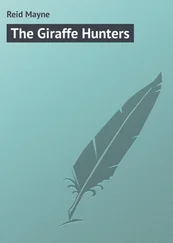Mayne Reid - The Boy Hunters
Здесь есть возможность читать онлайн «Mayne Reid - The Boy Hunters» — ознакомительный отрывок электронной книги совершенно бесплатно, а после прочтения отрывка купить полную версию. В некоторых случаях можно слушать аудио, скачать через торрент в формате fb2 и присутствует краткое содержание. Жанр: literature_19, foreign_antique, foreign_prose, на английском языке. Описание произведения, (предисловие) а так же отзывы посетителей доступны на портале библиотеки ЛибКат.
- Название:The Boy Hunters
- Автор:
- Жанр:
- Год:неизвестен
- ISBN:нет данных
- Рейтинг книги:3 / 5. Голосов: 1
-
Избранное:Добавить в избранное
- Отзывы:
-
Ваша оценка:
- 60
- 1
- 2
- 3
- 4
- 5
The Boy Hunters: краткое содержание, описание и аннотация
Предлагаем к чтению аннотацию, описание, краткое содержание или предисловие (зависит от того, что написал сам автор книги «The Boy Hunters»). Если вы не нашли необходимую информацию о книге — напишите в комментариях, мы постараемся отыскать её.
The Boy Hunters — читать онлайн ознакомительный отрывок
Ниже представлен текст книги, разбитый по страницам. Система сохранения места последней прочитанной страницы, позволяет с удобством читать онлайн бесплатно книгу «The Boy Hunters», без необходимости каждый раз заново искать на чём Вы остановились. Поставьте закладку, и сможете в любой момент перейти на страницу, на которой закончили чтение.
Интервал:
Закладка:
How long the conflict would have lasted, and which would have proved victor had they been left to themselves, is not known; for Basil and Lucien both fired, wounding the bear. This caused him to relax his hug, and he now seemed anxious to get off; but the reptile had seized one of his feet in his powerful jaws and thus held him fast, all the while crawling and dragging him down to the water. The bear was evidently aware of the intention of his antagonist, and uttered loud and pitiful moanings, at times screaming like a hog under the knife of the butcher. It was all to no purpose. His unrelenting enemy gained the bank; and dragging him along, plunged into the deep water. Both went down together – completely disappearing from the eyes of the spectators – and although the boys watched for nearly an hour, neither beast nor reptile were seen to rise again to the surface. The bear no doubt had been drowned at once, and the alligator, after having suffocated him, had hidden his carcass in the mud, or dragged it along the bottom to some other part of the bayou – there to make a meal of it at his leisure.
Chapter Eight.
About Alligators
The boys now returned to their tent, impressed with curious feelings by the scene they had just witnessed. They lay down upon the grass, and entered into a conversation, of which bears and alligators formed the subjects. The latter, however, with their singular and revolting habits, came in for the greater share of their talk. Many odd stories in relation to them were known to all, even to the little François; and Basil being an old hunter among the swamps and bayous, was acquainted with many of the habits of these animals. But Basil was not much of an observer; and he had only noticed such peculiarities as, from time to time, were forced upon his attention by the incidents of the chase. Lucien, however, had more closely observed their habits, and had also studied them from books. He was, therefore, well acquainted with all that is known to the naturalist concerning these animals; and at the request of his brothers he consented to while away the twilight hours, by imparting to them such information about them as he himself possessed.
“The alligator,” began he, “belongs to the order Sauria , or lizards. This order is again divided into several families, one of which is termed Crocodilida , or crocodiles; and the family of crocodiles is subdivided into three genera, each of which has several species.”
“How many species in all?” demanded Basil.
“There are not more than a dozen varieties of the whole crocodile family – at least, there are not more known to naturalists.”
“Then I was thinking why there should be all this division and subdivision into orders, families, genera, and species, for a dozen varieties of the same animal, and these all so like each other in shape and habits – are they not so?”
“They are,” answered Lucien, “very similar in their characteristics.”
“Then, why so much classing of them? It appears to me to be quite useless.”
“The object of this classing is to make the study of their natural history more easy and simple. But you are right, brother, in the present case; it appears quite useless, and only renders the thing more complex, and obscure. Where there are many varieties or species of a family or order of animals, and where these species differ widely from each other in appearance and habits, then such minute classifications become necessary to assist one’s memory; but I say again, brother, you are quite right as to the present case. There is no need for the numerous divisions and subdivisions which have been made of the crocodile family.”
“Who made them, then?” asked François.
“Who!” exclaimed Lucien, with some warmth; “who but closet -naturalists, old mummy-hunters of museums! Bah! it makes one angry.”
As Lucien said this, his usually mild countenance exhibited an expression of mingled indignation and contempt.
“What is there in it to make one angry?” inquired Basil, looking up at his brother with some astonishment.
“Why, to think,” answered Lucien, “that these same closet-naturalists should have built themselves up great names by sitting in their easy chairs measuring, and adding up, and classing into dry catalogues, objects which they knew very little about; and that little they obtained from the observations of others – true naturalists – men like the great Wilson – men who toiled, and travelled, and exposed themselves to countless dangers and fatigues for the purpose of collecting and observing; and then for these men to have the fruits of their labours filched from them, and descanted upon in dry arithmetical terms by these same catalogue-makers. – Bah!”
“Stay, brother; Wilson was not robbed of the fruits of his labours! He became famous.”
“Yes, and he died from the struggles and hardships that made him so. It reminds me of the fabled song of the swan, brother. He told his beautiful tale, and died. Ah! Poor Wilson, he was a true naturalist.”
“His name will live for ever.”
“Ay, that it will, when many of the philosophic naturalists, now so much talked of, shall be forgotten, or only remembered to have their quaint theories laughed at, and their fabulous descriptions turned into ridicule. Fortunately for Wilson, he was too poor and too humble to attract their patronage until his book was published. Fortunately for him he knew no great Linneus or Count Buffon, else the vast stores which he had been at so much pains to collect would have been given to the world under another name. Look at Bartram.”
“Bartram!” exclaimed François; “why, I never heard the name, Luce.”
“Nor I,” added Basil.
“There it is, you see. Few know his name; and yet this same John Bartram, a farmer of Pennsylvania, who lived an hundred years ago, did more to spread, not only a knowledge of American plants, but the plants themselves, than any one who has lived since. Most of the great gardens of England – Kew among the rest – are indebted to this indefatigable botanist for their American flora; and there were few of the naturalists of that time – Linneus not excepted – that were not largely indebted to him for their facts and their fame. They took his plants and specimens – collected by arduous, toilsome, and perilous journeyings – they put names to them – noble and kingly names – for king-sycophants most of them were, these same naturalists – they described them as they call it – such descriptions, indeed! and then adopted them as their own discoveries. And what did they give John Bartram in return for all his trouble? Why, the English king gave him 50 pounds to enable him to travel over thousands of miles of wilderness in search of rare plants, many of which on reaching England were worth hundreds of pounds each! This was all the poor botanist had for enriching the gardens of Kew, and sending over the first magnolias and tulip-trees that ever blossomed in England! What did the scientific naturalists do for him? They stole his histories and descriptions, and published them under their own names. Now, brothers, what think you of it? Is it not enough to spoil one’s temper when one reflects upon such injustice?”
Both Basil and François signified their assent.
“It is to such men as Hearne, and Bartram, and Wilson, that we are indebted for all we know of natural history – at least, all that is worth knowing. What to us is the dry knowledge of scientific classifications? For my part, I believe that the authors of them have obscured rather than simplified the knowledge of natural history. Take an example. There is one before our eyes. You see those long streamers hanging down from the live oaks?”
Читать дальшеИнтервал:
Закладка:
Похожие книги на «The Boy Hunters»
Представляем Вашему вниманию похожие книги на «The Boy Hunters» списком для выбора. Мы отобрали схожую по названию и смыслу литературу в надежде предоставить читателям больше вариантов отыскать новые, интересные, ещё непрочитанные произведения.
Обсуждение, отзывы о книге «The Boy Hunters» и просто собственные мнения читателей. Оставьте ваши комментарии, напишите, что Вы думаете о произведении, его смысле или главных героях. Укажите что конкретно понравилось, а что нет, и почему Вы так считаете.












